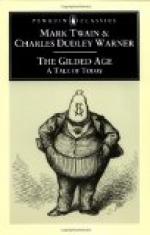Spring blossomed, summer came, dragged its hot weeks by, and the Colonel’s spirits rose, day by day, for the railroad was making good progress. But by and by something happened. Hawkeye had always declined to subscribe anything toward the railway, imagining that her large business would be a sufficient compulsory influence; but now Hawkeye was frightened; and before Col. Sellers knew what he was about, Hawkeye, in a panic, had rushed to the front and subscribed such a sum that Napoleon’s attractions suddenly sank into insignificance and the railroad concluded to follow a comparatively straight coarse instead of going miles out of its way to build up a metropolis in the muddy desert of Stone’s Landing.
The thunderbolt fell. After all the Colonel’s deep planning; after all his brain work and tongue work in drawing public attention to his pet project and enlisting interest in it; after all his faithful hard toil with his hands, and running hither and thither on his busy feet; after all his high hopes and splendid prophecies, the fates had turned their backs on him at last, and all in a moment his air-castles crumbled to ruins abort him. Hawkeye rose from her fright triumphant and rejoicing, and down went Stone’s Landing! One by one its meagre parcel of inhabitants packed up and moved away, as the summer waned and fall approached. Town lots were no longer salable, traffic ceased, a deadly lethargy fell upon the place once more, the “Weekly Telegraph” faded into an early grave, the wary tadpole returned from exile, the bullfrog resumed his ancient song, the tranquil turtle sunned his back upon bank and log and drowsed his grateful life away as in the old sweet days of yore.
CHAPTER XXIX.
Philip Sterling was on his way to Ilium, in the state of Pennsylvania. Ilium was the railway station nearest to the tract of wild land which Mr. Bolton had commissioned him to examine.
On the last day of the journey as the railway train Philip was on was leaving a large city, a lady timidly entered the drawing-room car, and hesitatingly took a chair that was at the moment unoccupied. Philip saw from the window that a gentleman had put her upon the car just as it was starting. In a few moments the conductor entered, and without waiting an explanation, said roughly to the lady,
“Now you can’t sit there. That seat’s taken. Go into the other car.”
“I did not intend to take the seat,” said the lady rising, “I only sat down a moment till the conductor should come and give me a seat.”
“There aint any. Car’s full. You’ll have to leave.”
“But, sir,” said the lady, appealingly, “I thought—”
“Can’t help what you thought—you must go into the other car.”
“The train is going very fast, let me stand here till we stop.”
“The lady can have my seat,” cried Philip, springing up.




